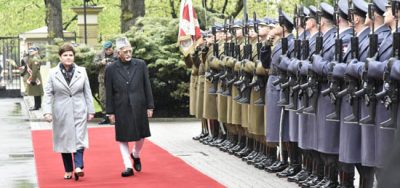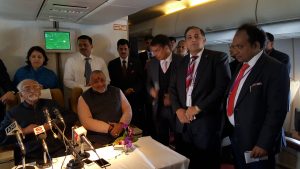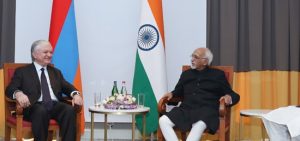
On Board Air India One/WARSAW: Exposing duplicity on terrorism, articulating multiple images of India, extolling seven decades of Indian democracy and the importance of building bridges with Central Europe and Eurasia. It’s a challenge to compress these weighty themes in a few minutes, but that’s precisely what Vice-President Hamid Ansari did in a mid-air interaction with journalists while on his way back from a five-day trip to Armenia and Poland.
Mr Ansari, a former diplomat and an erudite scholar, is not the kind to resort to fiery rhetoric, but he was full of eloquent indignation at the continuing duplicity of some states who hide behind technicalities on the pressing issue of terrorism, which he rightly described as “a universal epidemic.”
 Intensifying counter-terror cooperation figured prominently in his discussions with the top leadership of Poland and Armenia. India has been relentlessly pushing for Comprehensive Convention on International Terrorism for over two decades, but unfortunately some countries have chosen quibbles and sophistry to block its passage in the UN, which has stymied the fight against global terrorism. CCIT has a special resonance for Mr Ansari as it was during his tenure as India’s Permanent Representative of India to United Nations in New York in 1994 that India had launched a global outreach for CCIT. Till this day, the India-backed CCIT is embroiled in semantic sophistry and cold-blooded calculations by some countries due to their vested interests. Mr Ansari’s spirited response to a question on adopting the CCIT was, therefore, natural. Noting that every country is facing the problem of terrorism in a lesser or greater degree and understands the problem, Mr Ansari exposed sophistry practiced by some states by hiding behind technical niceties, a veiled reference to OIC nations which have been in the forefront of stalling the CCIT. While reaching an international agreement, all kinds of legal problems come up and those who do not want it to make progress, come up with legal technicalities, he said. It is an excuse on part of some countries to try to avoid committing themselves, he added. Mr Ansari’s remarks were well-timed as India renews diplomatic outreach to mobilise support for CCIT.
Intensifying counter-terror cooperation figured prominently in his discussions with the top leadership of Poland and Armenia. India has been relentlessly pushing for Comprehensive Convention on International Terrorism for over two decades, but unfortunately some countries have chosen quibbles and sophistry to block its passage in the UN, which has stymied the fight against global terrorism. CCIT has a special resonance for Mr Ansari as it was during his tenure as India’s Permanent Representative of India to United Nations in New York in 1994 that India had launched a global outreach for CCIT. Till this day, the India-backed CCIT is embroiled in semantic sophistry and cold-blooded calculations by some countries due to their vested interests. Mr Ansari’s spirited response to a question on adopting the CCIT was, therefore, natural. Noting that every country is facing the problem of terrorism in a lesser or greater degree and understands the problem, Mr Ansari exposed sophistry practiced by some states by hiding behind technical niceties, a veiled reference to OIC nations which have been in the forefront of stalling the CCIT. While reaching an international agreement, all kinds of legal problems come up and those who do not want it to make progress, come up with legal technicalities, he said. It is an excuse on part of some countries to try to avoid committing themselves, he added. Mr Ansari’s remarks were well-timed as India renews diplomatic outreach to mobilise support for CCIT.
Images of India
 In the days he spent in Poland and Armenia, the vice-president also observed multiple images of India that permeated the perception of the country among people of these countries. In both Armenian capital Yerevan and Polish capital Warsaw, one was struck by the popularity of Indian films and food. The people one spoke to had their own story to tell, while some were stuck with clichés and stereotypes. In a fundamental way, changing the narrative of one’s country is a crucial part of any diplomatic mission, and the high-level visit by the vice-president was quite a success in this respect. Responding to a question on the image of India in foreign countries, Mr Ansari said that India’s image outside, or image within the country is on different planes and multiple images are a fact of life. He cited the launch of the Mars mission by the Indian Space Research Organisation (ISRO) and the presence of Indian IT professionals across geographies have burnished the image of India, but at the same time cautioned that the image of an emerging knowledge power coexist with images of poverty and inequality. “But despite all this, it is also the fact that we have been able, for seven decades, to run a democratic system on a monumental scale,” he added.
In the days he spent in Poland and Armenia, the vice-president also observed multiple images of India that permeated the perception of the country among people of these countries. In both Armenian capital Yerevan and Polish capital Warsaw, one was struck by the popularity of Indian films and food. The people one spoke to had their own story to tell, while some were stuck with clichés and stereotypes. In a fundamental way, changing the narrative of one’s country is a crucial part of any diplomatic mission, and the high-level visit by the vice-president was quite a success in this respect. Responding to a question on the image of India in foreign countries, Mr Ansari said that India’s image outside, or image within the country is on different planes and multiple images are a fact of life. He cited the launch of the Mars mission by the Indian Space Research Organisation (ISRO) and the presence of Indian IT professionals across geographies have burnished the image of India, but at the same time cautioned that the image of an emerging knowledge power coexist with images of poverty and inequality. “But despite all this, it is also the fact that we have been able, for seven decades, to run a democratic system on a monumental scale,” he added.
Raising the Bar: Re-generating interest
 The vice-president’s visit to Armenia and Poland has re-invigorated India’s relations with these countries across the spectrum and, as Mr Ansari noted, “re-generated interest” in each other. The discussions and outcomes in both Yerevan and Warsaw were wide-ranging and substantive. “Armenia and Poland are friendly countries and we were able to regenerate interest in mutual cooperation,” he told journalists aboard Air India special aircraft.
The vice-president’s visit to Armenia and Poland has re-invigorated India’s relations with these countries across the spectrum and, as Mr Ansari noted, “re-generated interest” in each other. The discussions and outcomes in both Yerevan and Warsaw were wide-ranging and substantive. “Armenia and Poland are friendly countries and we were able to regenerate interest in mutual cooperation,” he told journalists aboard Air India special aircraft.
In Yerevan, India and Armenia, building upon their cultural connections spanning centuries, signed three pacts in areas of peaceful uses of outer space, cultural connections and youth exchanges.
In Warsaw, the biggest economy of Central Europe and the EU’s largest economy, Mr Ansari outlined the road ahead, saying India focused on three areas of interest — clean coal mining technology, agricultural products and techniques and defence cooperation. The Polish leadership and business community responded positively to Mr Ansari’s pitch for more proactive participation in Make in India. By joining the Make in India programme, Mr Ansari said he communicated to his Polish interlocutors that instead of being a seller only, they could become an India-based seller, which would give them a much additional advantages. Poland had identified some markets in Asia as priority markets, and India was one of them, he said. The India-Polish cooperation is set to scale new frontiers when the Polish president visits India later this year. Poland has struck an upbeat note about India’s rising global profile by backing India’s bid for NSG membership and a permanent seat in the expanded UN Security Council. “We are happy to have Poland’s support for India’s claim for permanent membership of an expanded UN security council,” Mr Ansari had said after his talks with the Polish prime minister.
Looking ahead, the challenge will lie in expanding mutual knowledge and awareness of each other’s potential and opportunities. Many middle and small countries have not figured high on India’s diplomatic canvas for decades, and it’s time to reverse this diplomatic deficit through high-level exchanges and initiating more people-to-people exchanges.
Author Profile

- Manish Chand is Founder and Editor-in-Chief of India Writes Network (www.indiawrites.org) and India and World, a pioneering magazine focused on international affairs. He is CEO, Centre for Global India Insights, an India-based think tank focused on global affairs.
Latest entries
 India and the WorldFebruary 17, 2026South-by-South: Focus on people-centric solutions at India AI summit
India and the WorldFebruary 17, 2026South-by-South: Focus on people-centric solutions at India AI summit India and the WorldFebruary 7, 2026Modi hails interim India-US trade deal, Goyal says no concessions made on agriculture
India and the WorldFebruary 7, 2026Modi hails interim India-US trade deal, Goyal says no concessions made on agriculture India and the WorldFebruary 2, 2026Trump announces trade deal with India, Modi ‘delighted’
India and the WorldFebruary 2, 2026Trump announces trade deal with India, Modi ‘delighted’ India and the WorldJanuary 31, 2026Palestinian minister bats for mediatory role for India in ending Gaza conflict
India and the WorldJanuary 31, 2026Palestinian minister bats for mediatory role for India in ending Gaza conflict







